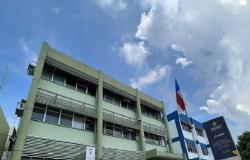
Building that caught fire in Porto Alegre did not have PPCI to function as a guesthouse
That same year, the Legislative Assembly approved the “Kiss Law”, with standards for preventing and fighting fires for all properties not considered as single-family, exclusively residential properties. However, over 11 years, the rule has been made more flexible and the deadlines for applying the rule have been extended.
For the vice-president of the RS Engineers Union (Senge), João Leal Vivian, the flexibility of the deadlines of the Kiss Law contributes to tragedies like the one at the inn.
“We widely publicized notes from entities saying that tragedies would happen and they did,” he states.
“As for the PPCI, it is up to the company that provides the service to provide it and it is up to the firefighters to decide on this topic”, says Mayor Sebastião Melo (MDB).
The owner of the company that owns the inn, André Luis Kologeski da Silva, claims that the fire on Avenida Farrapos, this Friday, was criminal and that the property is regularized.
“Two important points: it was arson, they set fire. We have the required documentation. All regularized. We will be arranging for it to be sent to the city hall”, he stated.
What is currently required in the PPCI:
- Single-family residence: exempt from licensing
- Agroforestry property: exempt from licensing
- Activity without customer service or stock of materials: exempt from licensing
- Area of up to 200 m² and up to two floors (low risk): exempt from licensing, but must have fire extinguishers, signage and emergency exits, a person trained to operate fire extinguishers and guide removal from the building and is subject to extraordinary inspections
- Area of up to 750 m² and up to three floors (low or medium risk): It is necessary to present a Simplified Fire Prevention and Protection Plan (PSPCI) with inspection waived for issuing the permit
- Area greater than 750 m² and other requirements (high risk): It is necessary to present a Fire Prevention and Protection Plan (PPCI) with inspection by firefighters before issuing the permit
Before the fire in Santa Maria, the current legislation on fires in the state dated back to the late 1990s. decree of 1997signed by the then governor Antônio Britto (MDB), determined that firefighters carried out an inspection of a property, for the building to be classified by the Brazilian Reinsurance Institute.
In Professor Ângela Graeff’s assessment, the focus of the rule was the protection of heritage.
“It determined that buildings needed to have fire safety designs, but it was quite outdated legislation,” explained the civil engineering professor to g1, in 2023.
The expert considers that the old standard did not detail issues as vertical and horizontal compartmentalization (technique to prevent fire from spreading throughout the levels of a property), control of finishing and coating materials, smoke controlbetween others.
Kiss Law: expert analyzes changes in fire prevention in RS
How it was after Kiss:
With the Kiss Law, buildings became classified as low, medium or high risk of flames. From there, the requirements were established. The standard started to consider area and height, as it was before, but also occupancy, maximum capacity, smoke control capacity, among other items. After meeting the requirements, the properties received a permit from the fire department.
In 2016, the Kiss Law underwent a series of changes. The validity period of the Fire Prevention and Protection Permit (APPCI), previously from one to three years, was extended to be valid from two to five years. Inspections for public meeting places are no longer annual and are now carried out every two years. In other locations, every five years.
According to the Legislative Assembly, there were no changes to high-risk buildings. But, at the time, there were flexibility for properties such as religious temples It is Gaucho tradition centers (CTGs).
At the time, the Fire Department Licensing Certificate (CLCB). The document exempted buildings with a total area of up to 200 m² and up to two floors from needing a permit. Today, this type of property needs to have some security items, without the need to present documentation.
Tags: Kiss Law adopted fire prevention legislation tragedy Santa Maria rule relaxed Rio Grande Sul
--




